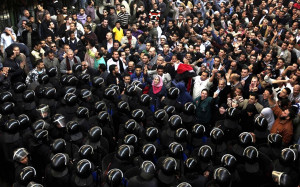
The face-off between the supporters of the secular state and the Islamists reached its boiling point on July 14, when a state of emergency was going to be introduced across the whole Egypt. The very same day saw the disperal of the sit-ins of the most radical of the Islamists supporters. The authorities it seems decided to resort to the services of the Special Forces in this conflict to prevent the sit-ins camps from transforming into the infinite sources of discontent and radical ideas, that can corrupt any society. The Islamists, in their turn, responded to the demolition of their street barricades with the outbursts of violence against the Egyptian Christians, civil servants and police personnel. This provoked a number of clashes that resulted in at least 800 people dead and thousands and thousands more injured.
The Egyptian society is split in two: one camp is determined to bring the Muslim Brotherhood back to power at almost any cause, the other will be doing its best to prevent this from ever becoming true. The former union was only possible due one simple idea every Egyptian had in common: Mubarak must leave the office. When in 2011 he had been finally toppled, there was no preventing the Egyptian society from fracturing.
“Once the Arab Spring started, every citizen knew what he’s up against and what he desires for himself and his country, but nobody did actually have a clear roadmap for taking the country out of the deep political and economic crisis.” – says Kamal Gabriel, the notorious Egyptian analyst – “The society doesn’t recognize the critical flaws that lay in the very core of the Egyptian national identity.
It’s no wonder that the military had to step up and take the weight of responsibly for the future of Egypt. Since 1952 the army has become one of the major players on the Egyptian political stage. The head of the staff turned out to be the most active and responsible part of the political elite in Egypt. Today, half a century later, the transition from an officer to a politician in Egypt has become commonplace.
The former government, the pre-Morsi one, had a particularly curious attitude towards different religious groups. At times it used them to satisfy their actual political needs, at times when the negotiations had gone flat it tried to suppress them. It tried to be a step ahead, to use their ideas and plans to its own advantage.When H.Mubarak was toppled, the rapidly changing political landscape left the military no chance but to take the observing position they were bound to provide stability during the rough times.But when the democratic elections in Egypt were to take place that’s where the Muslim Brotherhood kicked in. They took the power by legal means but largely misinterpreted the nature of this power. They’ve decided that, since they’ve won they can do whatever they please, but this was a critical mistake.
Yuri Zinin, senior researcher at MGIMO, exclusively for the online magazine “New Eastern Outlook”
